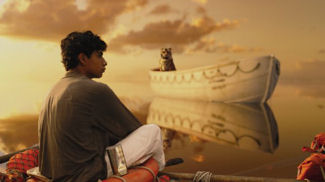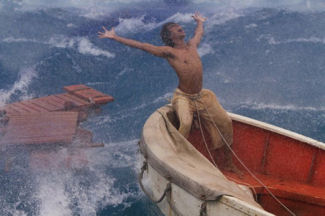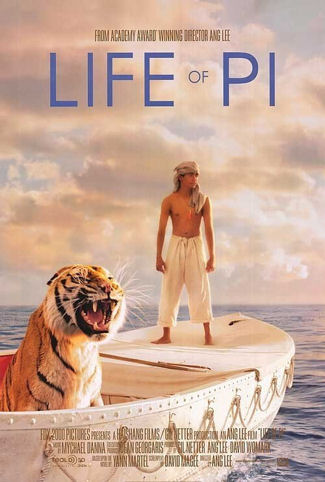|
Life of Pi
We have entered the age of 3D as part of the grammar of filmmaking. No longer does it have to be about explosions so close we can feel the heat, nor spears being pointed at us so we can reach out and try to touch the point. Nor does it have to be about tigers leaping at...oh.
Like Martin Scorsese with last year's Hugo, Director Ang Lee has taken the language of 3D and utilized it as a storytelling technique as valid as a wipe cut or a trick angle. With Life of Pi, he has done it in the service of a small but inspiring story, and yes, though absolutely justified, a tiger does leap at the audience.
That tiger, "the magnificent" Richard Parker, symbolizes what works and what doesn't about Lee's adaptation. At once full of personality without ever veering from realistic tiger behavior, he also keeps the audience at a distance because you can't help but marvel at the trickery. He is, after all, a CG tiger. He has to be. Isn't he? Is he real? And that internal argument makes it hard to submit to Life of Pi, even as Pi himself (Surej Sharma) submits to God.
The script by David Magee does a decent job of adapting Yann Martel's original novel. All the beats are there, and all the moments that should fill us with wonder are there on the screen. But while Lee is a talented director, he is also a little distant in his work.
I want to love this story. It begins with an interesting slice of life in India, as the older Pi (Irrfan Khan) tells the story of his youth to a character known as "The Writer" (Rafe Spall). It's charming, about growing up in a zoo while absorbing bits and pieces of a variety of religions. He learns a harsh lesson when his father (Adil Hussain) forces him to watch Richard Parker kill and eat a goat. He falls in love for the first time.
 And then Lee gets to the meat of the story. The family sells the zoo animals and begins an ill-fated journey to Canada. Already lush when dealing with India (or the memory of India), it becomes a feast of visual invention on the high seas. But many shots feel like invention, as opposed to something like Tarsem's flawed but gorgeous The Fall, which depended on actual locations to be dazzling. And then Lee gets to the meat of the story. The family sells the zoo animals and begins an ill-fated journey to Canada. Already lush when dealing with India (or the memory of India), it becomes a feast of visual invention on the high seas. But many shots feel like invention, as opposed to something like Tarsem's flawed but gorgeous The Fall, which depended on actual locations to be dazzling.
Sharma carries it all well enough, whatever he's acting against. It's just one of those stories that requires a lot of silent reflection from the face of a callow youth, albeit one becoming less callow as the sun beats down upon him. To top it all off, much of his best work has to be done while soaking wet. But his griefs seem real, and what few joys he gets are effulgent on his face. At least he gets variation.
The modern day scenes don't fare quite so well. As the Writer, Spall ends up as generic as his character name. While he may be a game actor, Lee never pushes him past the wooden puppet test, i.e., his expression never varies from subdued wonder to be in Pi's presence.
 Irrfan Khan also gets little to do but narrate with a bemused expression, but he does exude a great warmth that contrasts nicely with his other major U.S. film appearance this year, in Amazing Spider-Man. It becomes easy to understand why he is one of India's top actors; if he wants American stardom, he certainly deserves it. Irrfan Khan also gets little to do but narrate with a bemused expression, but he does exude a great warmth that contrasts nicely with his other major U.S. film appearance this year, in Amazing Spider-Man. It becomes easy to understand why he is one of India's top actors; if he wants American stardom, he certainly deserves it.
Maybe what Life of Pi lacks is schmaltz. The score is serviceable but not quite stirring, and Pi's life is, like all of ours, a bit inconclusive. So people who want to approach it with their minds might do better. But the submission Pi wishes to achieve is in the heart, and Lee just can't quite pluck the heart strings.
So see it for its technical achievement and an interesting plot. But to release and feel moved, you're better off with Wreck-it Ralph.
|

 And then Lee gets to the meat of the story. The family sells the zoo animals and begins an ill-fated journey to Canada. Already lush when dealing with India (or the memory of India), it becomes a feast of visual invention on the high seas. But many shots feel like invention, as opposed to something like Tarsem's flawed but gorgeous The Fall, which depended on actual locations to be dazzling.
And then Lee gets to the meat of the story. The family sells the zoo animals and begins an ill-fated journey to Canada. Already lush when dealing with India (or the memory of India), it becomes a feast of visual invention on the high seas. But many shots feel like invention, as opposed to something like Tarsem's flawed but gorgeous The Fall, which depended on actual locations to be dazzling.
 Irrfan Khan also gets little to do but narrate with a bemused expression, but he does exude a great warmth that contrasts nicely with his other major U.S. film appearance this year, in Amazing Spider-Man. It becomes easy to understand why he is one of India's top actors; if he wants American stardom, he certainly deserves it.
Irrfan Khan also gets little to do but narrate with a bemused expression, but he does exude a great warmth that contrasts nicely with his other major U.S. film appearance this year, in Amazing Spider-Man. It becomes easy to understand why he is one of India's top actors; if he wants American stardom, he certainly deserves it.





